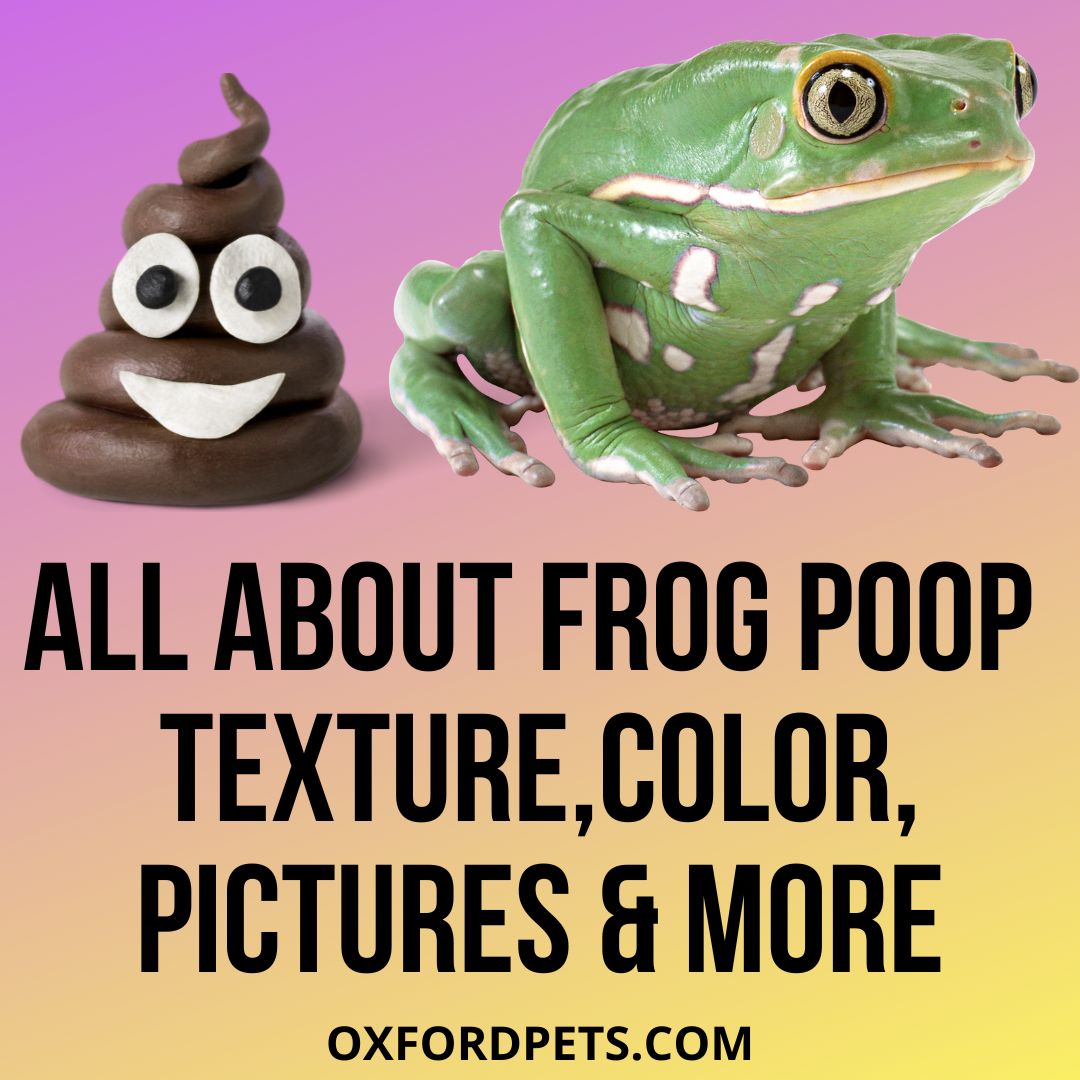A frog is an amphibian and as such, they are known to produce a variety of fecal matter. But, What does a frog poop look like? Do Frogs and toads have different poop textures? How to Identify which frog or toad is pooping in my backyard? Well Surprisingly, the answer to this question is quite varied depending on the species of frog.
If you’ve ever wondered what a frog’s droppings look like, now you can find out for yourself! Read On Further
Contents
- How Does a frog poop look like? Ways to Know
- How do frogs poop?
- Does Frog food affect its poop Texture?
- What does a frog’s digestive system look like?
- How do frogs excrete their waste?
- What does a frog’s digestive system do with the frog poop?
- How does a frog digest its food?
- Why do frogs poop?
- How can you see a frog pooping?
- How to Dispose of frog poop?
- Diseases That Spread from Frog’s Poop
- Frog Droppings Identification
- Do Frogs Pee And Urinate?
- How do frogs pee and urinate?
- Why do frogs need to pee and urinate?
- Frog Vs Toad Poop Identification
- Frog Poop Vs Snake Poop Comparison
- Frog Poop Vs Mouse Poop Comparison
- Frog Droppings Vs Rat Droppings
- Frog Poop Vs Lizard Poop Differences
- Frog Poop Vs Bat Poop Comparison
- frog and Toad Poop Pictures
- Frog and Toad Poop Videos collection
- Summary
How Does a frog poop look like? Ways to Know
Frogs are one of the most popular animals to observe in nature. They are also quite unique in that they are able to move their limbs and eyes independently of each other, making them a challenge to study.
One common question people ask about frogs is what they poop like. Unfortunately, there is no one answer to this question since it varies depending on the species of frog.
However, some general observations can be made about how frog poo looks.
For example, the common green frog produces brown or black excrement that can be up to three inches long. However, some frogs, such as bullfrogs, produce greenish-yellow turd that is about two inches long.
Frog poo generally has a greenish-brown color and is typically about the size of a rice grain. It often has a slightly foul odor and often contains small pieces of grass or leaves.
Overall, frog poo is a fascinating and unique way to see how different species of frogs live and function in their natural environment.
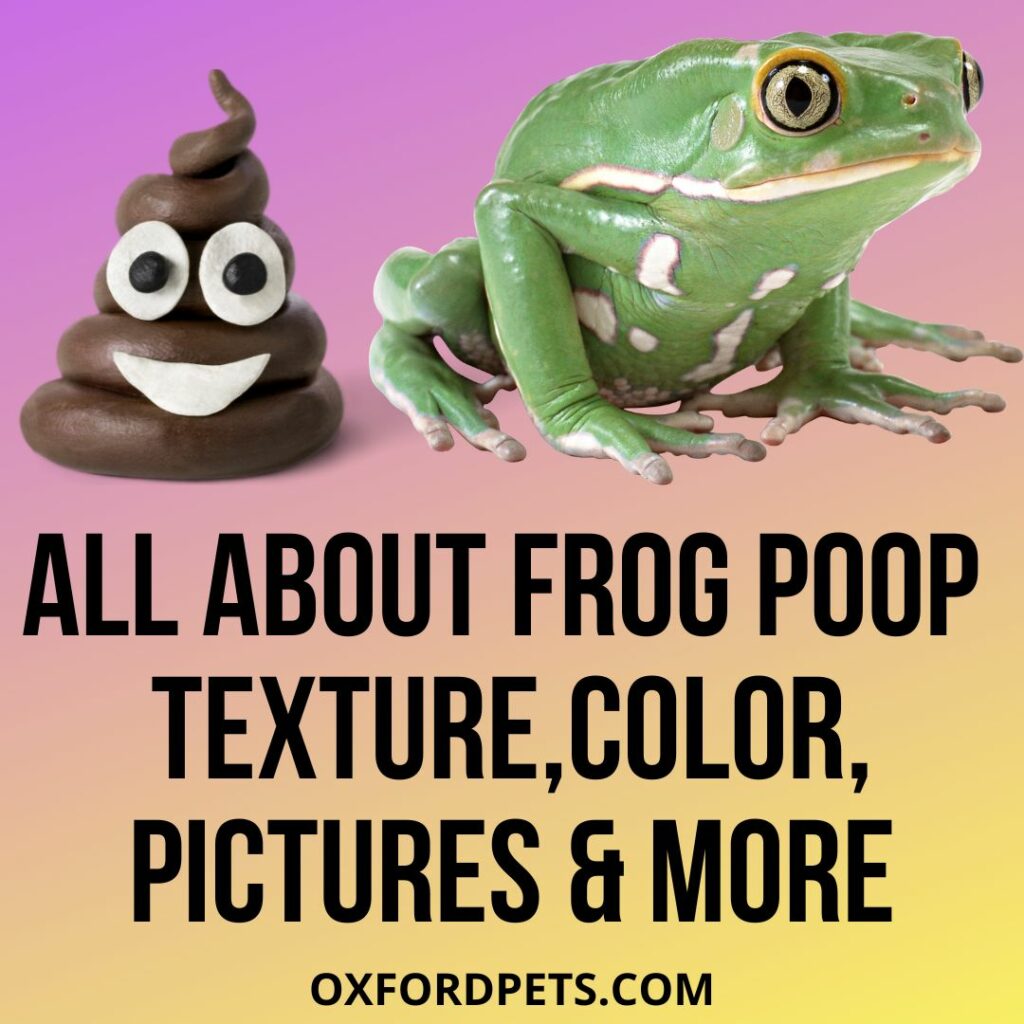
How do frogs poop?
Frogs have a special way of excreting their waste. Instead of using their back legs to push feces out, they use their front ones to flip the stool over. This way, they can keep a close eye on what’s coming out and make sure it doesn’t contain any harmful parasites or other contaminants.
The process of excreting is fairly simple for frogs. They squat down with their back towards the water and bring their hind legs up so that the front ones are resting on top of the stool. They then use their abdominal muscles to push the stool forward and out of their body.
Frog poop isn’t just dark in color because of all the toxins that have been expelled – it also has a strong smell.
This is thanks to all the bacteria that live in frog intestines, which help break down food particles and produces an unpleasant odor.
Although frogs aren’t typically thought of as pests, their pooping habits can cause some problems for ecosystems.
Frogs are known to eat small invertebrates, which can crowd out other species in an area and lead to ecological disaster. Additionally, their feces can contain chemicals that can harm plants when it rains on them.
So while frog poop may stink and be a nuisance, it’s important to remember that it’s also an important part of their natural ecosystem.
Does Frog food affect its poop Texture?
A frog’s diet consists of insects, other small animals, and plant material.
Frogs that consume higher levels of plant material tend to produce larger and more varied poop, as the plant material provides more nutrients for the frog.
Poop from frogs that consume a high level of insects or meat typically has a finer texture due to the high level of protein and other nutrients in these types of diets.
Overall, the texture of a frog’s poop will vary depending on the foods it consumes.
What does a frog’s digestive system look like?
Frogs have a simple digestive system that basically involves them eating food and then using their stomach to break it down.
Their intestines are also very short, so they don’t need to waste a lot of time digesting food.
Frogs also have a very efficient liver, which helps them to break down toxins and waste products from their food.
Overall, their digestive system is fairly simple, but it’s still very efficient at breaking down food.

How do frogs excrete their waste?
Frogs excrete their waste through their anus. Their waste is either brown or black, and it is sticky because of the mucous they produce.
Frogs have a filter-feeding system in their mouths where they strain food particles and water through their teeth.
This process cleans their mouth and throat of bacteria, which is why they excrete brown or black waste that is often sticky.
Frogs use their front legs to scoop up water before they excrete. This helps to soften their waste and makes it easier for them to expel it.
What does a frog’s digestive system do with the frog poop?
Frog poop is a mixture of fiber, nitrogen, water, and minerals. The frog’s digestive system breaks down the poop to extract nutrients and energy for the frog.
Frogs have a four-chamber stomach that separates the food from the digestive juices. This helps to speed up digestion and keep the frog clean.
The digestive juices in the frog’s stomach break down the poop into small pieces. This helps to extract nutrients and energy that the frog can use.
The water and minerals in the poop help to nourish the frog’s body.
How does a frog digest its food?
Frogs are one of the most diverse and interesting creatures on the planet. Their bodies are covered with a thin layer of skin that helps them breathe and keeps them moist.
Underneath the skin is a layer of rough, scaly skin that helps protect them from predators.
Frogs have two sets of lungs – one for breathing air and one for breathing water. They also have a system in their stomach called an esophagus that helps them digest food.
Frogs eat mostly insects, but they will eat other things if they can get them. What does a frog poop look like? Most frogs poo pellets, but some frogs poo something else – like larvae or small fish. Pellets are about 2-3 inches long and 1/4 inch wide, and they’re made up of about 50% water and 50% feces.
Pellets are round or oval, and they’re either green or brown. Some frogs also poo liquid, but pellets are the most common type of poop.
How do frogs use their bladders and kidneys?
Frogs use their bladders and kidneys to control their body temperature. They also use their bladders to get rid of waste.
Frogs also have a special way of digesting food that helps them stay slim and healthy.
Why do frogs poop?
Frogs poop to rid their bodies of waste. Poop is a way for frogs to get rid of bad bacteria and other toxins in their system. It’s also a way for frogs to spread their eggs in fresh soil.
Like Humans, Frogs also poop out to remove waste food (excreta) and to cool their bodies.
A frog’s intestines are like a sewer, and they excrete a mix of water, fecal matter, and bits of food.
Frogs generally poop about once every two days, but they can go up to eight days without pooping.
Frogs use their hind legs to help them push the poop out. They also have a cloaca, which is like a butt hole, and they use it to poop.
How can you see a frog pooping?
What does a frog poop look like? If you’re lucky, you might get to see one frog pooping in nature! Frogs poo out of their hindquarters- the part of a frog’s body between its legs.
Poop can vary in color depending on what kind of frog it is, but typically it’s light brown or grey. Some frogs also add black spots to their poop to make it look like dirt!
How to Dispose of frog poop?
If you have a frog in your backyard, it’s likely that they’ve been depositing their droppings all over the place. Frogs are partial to moist environments, so their droppings are often quite wet.
If you’re not interested in keeping a frog as a pet, you may want to dispose of their droppings in a humane way. Here are some tips on how to do that:
– Scoop up as much of the frog’s droppings as possible and place them in a plastic bag or container.
– Seal the bag or container and throw it away. Make sure to get rid of the bag or container properly so that the frogs’ waste doesn’t contaminate local water supplies.
Diseases That Spread from Frog’s Poop
Several diseases spread from frogs to other animals through their feces. For example, the fungus Batrachochytrium dendrobatidis causes chytridiomycosis in amphibians, which can then infect other animals through contact with infected amphibian skin or larvae.
Other diseases that can be spread through frog feces include the protozoan parasites Giardia lamblia and Cryptosporidium parvum, as well as the nematode worm Heterophyidae.
Frogs excrete a nitrogen-rich secretion that can be used to communicate with other frogs or serve as a food source for predators. Though benign in most cases, some amphibian diseases can affect frogs, resulting in deformities such as shrunken testicles or deformed hind legs.
Frog Droppings Identification
When people think of frogs, they tend to think of cute little creatures that hop around in ponds. However, frogs are also responsible for generating a disgusting mess – their droppings! Frog droppings can vary in color, shape, and size, but they all share some common features.
Here is a look at what frog droppings look like and how to identify them:
Frog Droppings Identification
1. Frog droppings are typically green or greenish-gray in color and have a slimy texture.
2. Frog droppings are usually round or slightly oblong in shape and range in size from about .5 inches to 2 inches wide and from about 1 inch to 3 inches long.
3. Frog droppings may contain small pieces of food or feces, as well as shed skin cells.
4. Frog droppings are often deposited near water sources or in wet areas.
5. Frog droppings can be collected and examined if you are interested in learning more about the behavior and ecology of frogs.
Knowing what to look for when examining frog droppings can help you identify these animals and their droppings in the wild or in your backyard.
Do Frogs Pee And Urinate?
This is a question that has puzzled scientists for centuries, but according to a new study, the answer may be yes.
A frog’s urine is clear and very similar to water. Frogs also release a substance called uric acid when they pee, which can make their urine smell acidic.
The study, which was published in the journal PLOS ONE, found that when frogs are threatened or harassed they release a substance called “acridogen” from their kidneys. This acridogen is responsible for the distinctive smell of urine and is also used to deter predators.
The study authors believe that this information could be useful in designing environmentally-friendly deterrents for amphibians, such as pesticides or repellents.
What does a frog’s pee smell like?
Do frogs pee and urinate? The answer is yes, but it doesn’t smell very good! Frogs produce a foul-smelling fluid from their kidneys that helps them to regulate their body temperature. This fluid is also responsible for the characteristic frog odor.
How do frogs pee and urinate?
Frogs are aquatic species, so their kidneys are adapted to process water. They also have a Functional Upper Gland (FUG) on their leg that helps them extract urine from their bladder. Frogs use their hind legs to push urine out of their cloaca (their vent).
Why do frogs need to pee and urinate?
Frogs need to pee and urinate in order to stay healthy. When they are in water, their kidneys clean and filter their blood. They also release ammonia which helps to break down food in their intestines. When they come out of water, their kidneys stop cleaning their blood and they start to produce urea which is a by product of protein metabolism. Urea is then excreted through the kidneys.
Frog Vs Toad Poop Identification
Frogs and toads are two of the most common animals found in the wild. They both have a number of interesting behaviors, but one of the most interesting is their poop. Both frogs and toads produce a characteristic brown or black solid waste.
However, there are some differences between the two. Here is a look at what frog and toad poop look like:
Frog Poop: Frog poop is usually green or brown and has a granular texture. It can range in size from small pebbles to larger pieces that resemble rocks. Frogs typically eat a variety of plant matter, so their poop can contain vegetables, fruits, and other nutrients.
Toad Poop: Toad poop is mostly black and has a glossy appearance. It tends to be smaller in size than frog poop and does not contain as many nutrients. Toads primarily eat insects, so their feces may contain larval or adult insects.
Frog Vs Toad vs Snake Vs Lizard vs Rat Poop Chart
| Animal Name | Poop Texture | Size (Compared to Rice) | |
| RAT/MICE | Cylindrical Shaped (Brown) Found in Groups | Same or Smaller Size | |
| SNAKES | Slimy or Watery (White & Yellow Portion) | Usually Much Larger | |
| FROG/TOAD | Singular Pellet Shaped (Dark Brown & Black) | Larger Than Rice | |
| LIZARD | Oval Shaped with a White Tip (Urate) | Medium-Sized and Similar |
Frog Poop Vs Snake Poop Comparison
If you ask any amphibian biologist, they will tell you that there is no real difference between frog and snake poop.
In fact, some scientists say that the two types of excrement are actually very similar when it comes to their composition.
That being said, there are some notable differences between the two types of excrement. For one, frog poop typically has a higher water content than snake poop does. This is likely because frogs tend to live in wet environments, while snakes typically live in dry environments.
Additionally, frog poop is also more acidic than snake poop is. This is due to the high levels of nitrogen and phosphorus that are found in frog feces.
So while there isn’t a whole lot of difference between frog and snake poop, there are definitely some key distinctions worth noting if you’re interested in learning more about these fascinating creatures.
Frog Poop Vs Mouse Poop Comparison
Do frogs poop like mice? You betcha! When it comes to the average frog’s diet, their fecal matter is pretty much all that matters. In fact, a frog’s digestive system is so efficient that it can actually digest its own skin and bones! That said, there are some key differences between frog and mouse feces.
Here’s a rundown:
1) Frogs tend to produce larger droppings than mice. This is due in part to the difference in their digestive systems – mouse droppings are mostly composed of food waste, while frog droppings are packed with nitrogen-containing compounds and other nutrients necessary for the frog’s health.
2) Frog droppings are typically green or brown in color, while mouse poop can be any color. This is due to the different bacteria and other microorganisms that live in each animal’s intestines.
3) Frog droppings usually have a slightly sweet smell, while mouse poop does not. This is because frogs ferment their food in their intestines before excreting it, which produces gas and fermentation products (such as alcohol).
4) Frog droppings often have a slimy texture, while mouse droppings are ickier and more dried out. This is because frog droppings are full of water, which helps to keep their droppings moist and easy to move. Mouse droppings, on the other hand, are mostly composed of dry waste products.
Frog Droppings Vs Rat Droppings
Rat droppings are noticeably different from a frog’s droppings. Their droppings are rounder and more compact, while a frog’s droppings are more spread out and flatter.
Rat’s poop also has smaller pieces of food embedded in them, while a frog’s droppings typically have only one or two pieces of food embedded in them.
Frog Poop Vs Lizard Poop Differences
Frogs and lizards are two of the most common amphibians in North America. They are also two of the most diverse frog species.
Frogs produce a number of different types of feces, including coprolites, carrion, and royal jelly. Carrion is a mixture of indigestible parts of the animal with feces.
Royal jelly is a sticky secretion from the glands on the tongue of some frogs that they use as a food source for their larvae.
Lizards are more specialized than frogs in their dietary habits. Most Lizards usually eat insects, but they can also consume small animals, such as frogs. Lizards excrete pellets that consist of insect chitin, which is an important part of their diet.
Frog Poop Vs Bat Poop Comparison
Bat poop is a little bit different than frog poop. It’s mostly black and has bigger pieces in it. The smell isn’t as bad as frog poop and it usually doesn’t have as many bacteria.
Frog poop is usually a light green color and has smaller pieces in it. The smell is worse than bat poop and it usually has a lot of bacteria.
Overall, bat poop is better than frog poop because it’s less smelly, has more pieces, and is full of bacteria. and act as an organic fertilizer for farming in many countries.
frog and Toad Poop Pictures
Green Tree Frog/ Waxy Monkey Frog Poop pictures
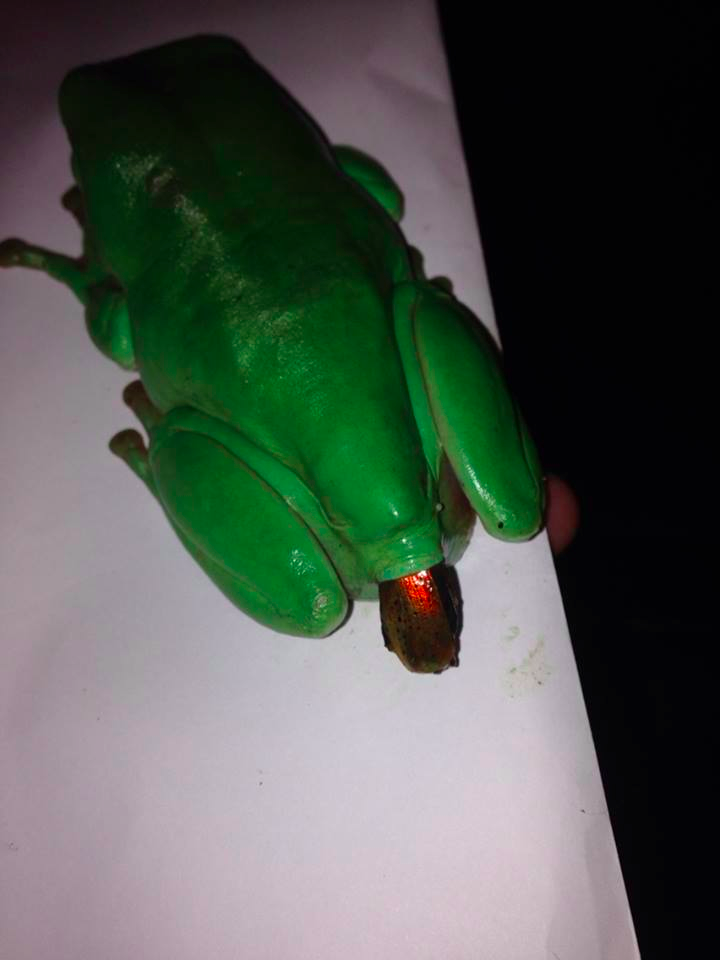
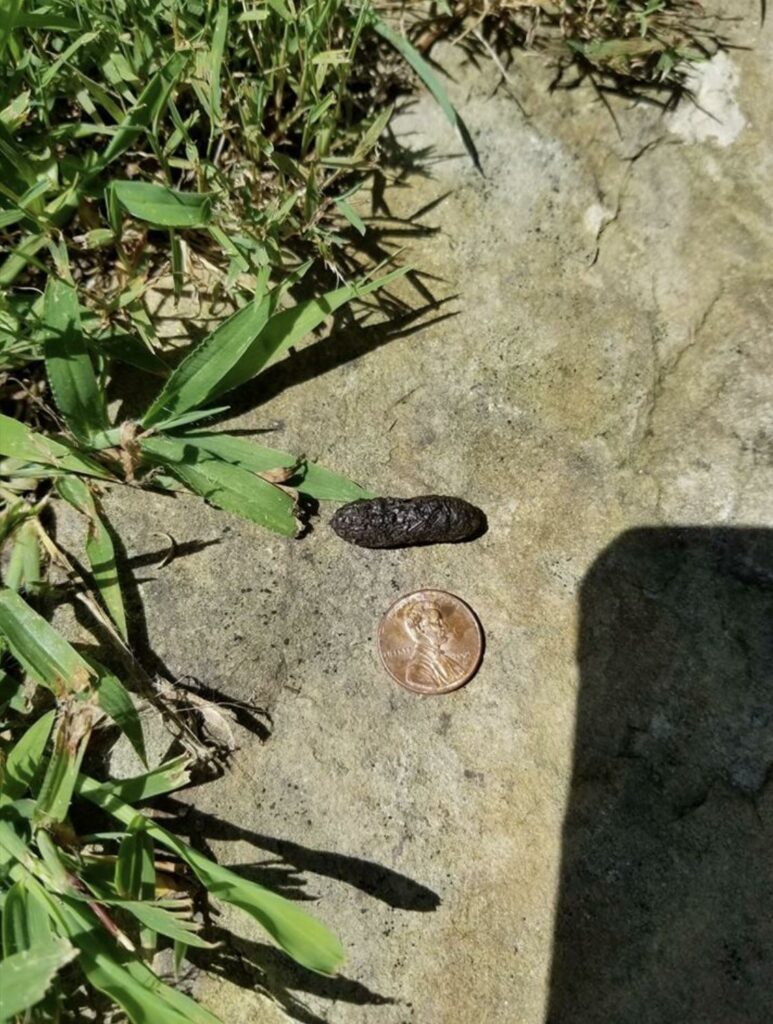
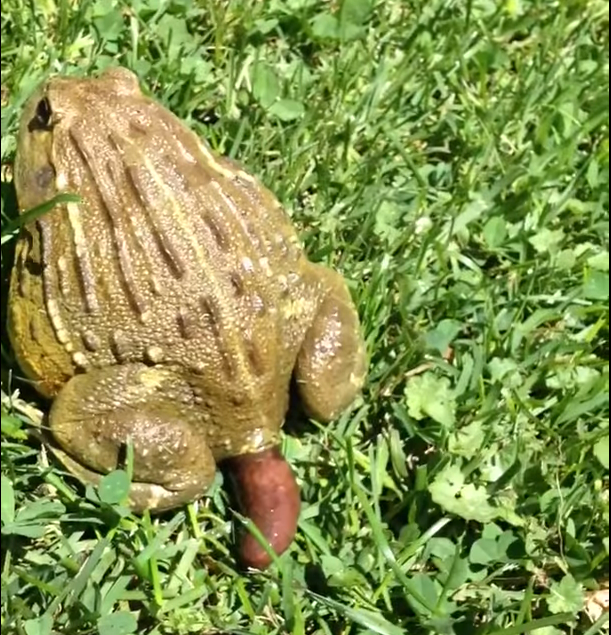
Frog and Toad Poop Videos collection
Video Credits: Amphibianlife.com
Summary
So there you have it! Now you know a bit more about what different types of poop look like and what to expect when you’re going to see them. If this interests you, be sure to check out our other blog posts on topics like animal facts and weird animal behavior!
References: Amphibian Life: A Guide on Frog and Toad Poop With Pictures
